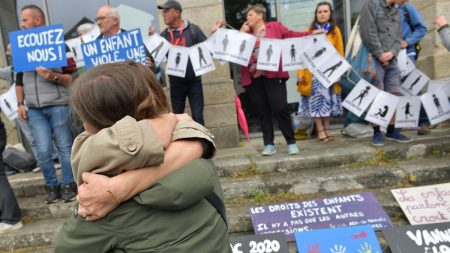Mackenzie Watson, a dog walker residing on Manhattan’s Upper West Side, has become a source of terror for his neighborhood due to his fervent anti-Israel stance and aggressive behavior. Following the Hamas attack on Israel in October 2023, Watson has engaged in a campaign of harassment and vandalism, targeting individuals who display posters supporting Israeli hostages or remove pro-Palestinian stickers. Neighbors have labeled him “MackNazi” and report numerous hostile encounters, describing Watson as fixated on his crusade against perceived pro-Israel sentiment. He’s been observed neglecting his dog-walking duties while ripping down posters and stickers, seemingly prioritizing his political agenda over his responsibilities. Watson’s sister, Jamie Linn Watson, an actress with appearances in various television shows and films, reportedly lives with him.
Watson’s aggressive actions have escalated to physical violence and verbal assaults. In one instance, he allegedly harassed a mother and her teenage daughter who removed one of his “antisemitic” stickers, following them for several blocks while shouting obscenities and expressing indifference towards the Israeli hostages. Another incident involved an architect, Gary Paul, who reported multiple hostile confrontations with Watson, resulting in Watson pursuing him for several blocks. The escalating nature of these encounters has left residents feeling unsafe and apprehensive. A separate confrontation involved a woman who was posting stickers raising awareness for Israeli and American hostages. Watson reportedly screamed misogynistic slurs at her while aggressively filming her, leaving her fearful and resorting to carrying pepper spray for protection.
In November 2023, Watson assaulted Joseph Goodrich, dislocating his shoulder, after Goodrich attempted to stop him from tearing down hostage posters. While Manhattan District Attorney Alvin Bragg’s office initially charged Watson with assault, a plea bargain resulted in a conditional discharge contingent on anger management courses and maintaining a clean record. However, just two months later, Watson violated this agreement by allegedly assaulting another individual who intervened in his attempt to remove a hostage poster. This subsequent arrest led to new charges of assault and harassment, and the DA’s office requested the court to revoke the previous conditional discharge.
These repeated incidents paint a picture of a man consumed by his anti-Israel sentiment, resorting to increasingly hostile and violent tactics to express his views. The fear and unease he has instilled within his community highlight the disruptive and dangerous nature of his actions. His blatant disregard for the plea agreement, coupled with the escalating severity of his actions, underscores the urgent need for effective intervention. The pattern of harassment and violence suggests a deeper issue beyond mere political disagreement, raising concerns about the potential for further escalation.
Watson’s case echoes a broader trend of individuals tearing down hostage posters and engaging in similar disruptive behavior in the aftermath of the Hamas attack. The incident involving Nallah Sutherland, an Adam administration staffer responsible for bridging cultural divides, further exemplifies this trend. Sutherland’s initial disciplinary action, which involved multicultural training classes and a note on her file, was deemed insufficient by Mayor Eric Adams, who subsequently intervened and indefinitely suspended her without pay. This response underscores the growing recognition of the seriousness of such actions and the need for more robust consequences to deter similar behavior.
The actions of individuals like Watson and Sutherland highlight the complexities and sensitivities surrounding the Israeli-Palestinian conflict, particularly within diverse urban environments like New York City. Their behavior underscores the potential for extremist views to manifest in disruptive and harmful ways, impacting community safety and exacerbating existing tensions. These incidents also raise questions about the adequacy of current legal and administrative responses to such behavior and the need for more effective strategies to address the root causes of these conflicts and promote peaceful coexistence. The escalating nature of Watson’s actions and the community’s growing fear raise concerns about the potential for further escalation and the necessity for a more robust response from law enforcement and the justice system. The case serves as a stark reminder of the challenges faced in maintaining peace and respect within communities grappling with deeply divisive political issues.










